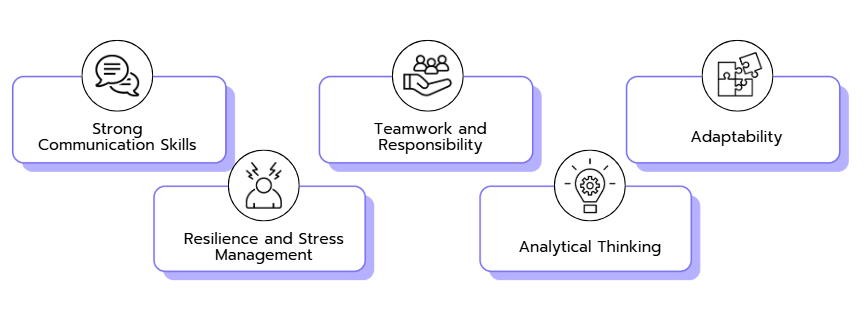just as important for building a successful career in investment banking.
In this article, we’ll break down the key soft skills you need, how they are assessed during the hiring process, and how you can develop them to stand out.
just as important for building a successful career in investment banking.
In this article, we’ll break down the key soft skills you need, how they are assessed during the hiring process, and how you can develop them to stand out.
Soft skills are the “human” abilities that show how you communicate, collaborate, and handle challenges. They include teamwork, resilience under pressure, persuasion, and quick analytical thinking.
Why does this matter? Because investment banking is a people's business. Whether you're negotiating deals with clients, working under tight deadlines with your team, or making a strong impression in an interview – your soft skills shape how others see you and how far you’ll go. Relying solely on technical skills won’t be enough in the long run. That’s why developing your interpersonal skills is just as important as mastering financial models!
There are several key soft skills that play a crucial role in investment banking, as they directly impact your daily work. Constant client interaction, tight deadlines, and complex deals require more than just technical expertise – they demand strong interpersonal and organizational skills. Here are the most important soft skills you’ll need to succeed:

Strong Communication Skills
Whether you're presenting financial reports, speaking with clients, or leading internal meetings, the ability to explain complex financial concepts clearly and persuasively is a major advantage. Investment bankers don’t just need to understand the numbers – they need to communicate them effectively.
Resilience and Stress Management
Long hours, tight deadlines, and high-pressure projects are part of daily life in finance. Staying focused, well-organized, and composed under stress is essential to thriving in this demanding environment.
Teamwork and Responsibility
Investment banking is all about collaboration. As an analyst or associate, you’ll work closely with colleagues and rely on strong teamwork. At the same time, you’re expected to take ownership of your work, be proactive, and handle responsibilities independently.
Analytical Thinking
It’s not enough to process data – you need to interpret it and make smart, strategic decisions. This requires both logical reasoning and a strong understanding of markets, deals, and long-term trends.
Adaptability
Investment banking moves fast. Priorities shift daily, deals take unexpected turns, and new challenges constantly arise. Those who stay flexible, quickly grasp new concepts, and structure their work effectively will have a clear edge.
A key part of most interviews is the "fit" section, where banks evaluate whether you’re a good personality match for their team. You’ll often get questions like “Tell me about a time you worked under tight deadlines” or “How do you handle conflicts in a team?” It’s not just about what you say, but how you say it—structured thinking, confident reasoning, and authenticity are crucial.
👉 Prepare for tough fit questions with our stress question tool!
In addition to these behavioral questions, many banks conduct case interviews to test your analytical and strategic thinking. You’ll be given a case study or business problem to solve under time pressure, requiring a structured approach.
Most investment banks also use assessment centers, where candidates are evaluated in realistic business scenarios. Group exercises, presentations, and role-playing tasks quickly reveal who can communicate effectively, assert themselves, and stay calm under stress. These assessments focus heavily on teamwork, resilience, and problem-solving skills.
However, interviews aren’t the only place where soft skills matter – networking events and informal conversations can also influence hiring decisions. You may meet bankers who later have a say in your application, so how you present yourself, engage in discussions, and balance professionalism with authenticity can make a lasting impression.
👉 Want to master networking in investment banking? Check out our full guide!
Soft skills take time to develop, but they can be actively improved. As a student, you have plenty of opportunities to build key skills like communication, resilience, and teamwork. The earlier you start, the more experience you’ll gain – giving you a competitive edge when it comes to applications.
Gain Experience Through Internships and Student Jobs
The best way to prepare for investment banking is hands-on experience. Internships don’t just teach you technical skills – they also help you develop effective communication with colleagues and managers, teamwork, and time management under pressure. The more responsibility you take on in a fast-paced environment, the more valuable your experience will be.
Leverage Networking and Mentorship
Connecting with experienced bankers helps you understand industry expectations and refine your soft skills. Attend career events, build relationships, and practice speaking confidently with professionals. A mentor can also provide valuable feedback on your communication, presence, and overall professional demeanor.
Practice with Mock Interviews
Mock interviews are a great way to improve your communication, argument structure, and confidence under pressure. Simulating real interview scenarios helps you learn to answer concisely, stay calm under stress, and present yourself professionally. The feedback you receive afterward is crucial – it shows you where you can improve.
👉 Find like-minded peers on our Meeting Board and start practicing mock interviews today!
Consider Working With an Interview Coach
Coaching can take your preparation a step further. A professional coach can help you refine your self-presentation, improve your body language, and sharpen your problem-solving skills. You’ll also receive personalized strategies to enhance your soft skills and boost your confidence during the application process.
👉 Check out our Coach Directory to find the right expert to help you ace your IB applications!
Train Your Soft Skills Independently
Even outside of university and internships, you can work on your soft skills. Practice explaining complex topics in a simple way, give presentations, or refine your communication through discussions. Books, podcasts, and online courses on public speaking, time management, and negotiation techniques can also help you develop professionally.
Investment banking is fast-paced, highly collaborative, and client-driven. That’s why soft skills like communication, resilience, teamwork, analytical thinking, and adaptability play a crucial role in career success – just as much as financial expertise.
These skills are actively tested throughout the hiring process, whether in fit interviews, case interviews, or assessment centers. Banks don’t just look for technical competence; they want candidates who can communicate confidently, make smart decisions under pressure, and integrate well into their teams.
The good news? Soft skills can be developed. Internships, mock interviews, networking, and coaching provide valuable opportunities to sharpen these abilities in real-world situations. Those who start early – working on self-organization, professional presence, and persuasion skills – will enter the application process with a clear advantage and set themselves up for a strong start in investment banking.

